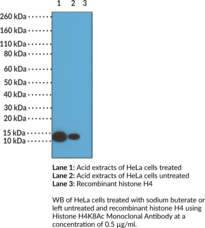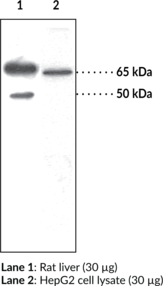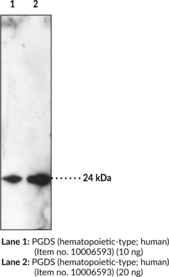Description
Histone H4 is one of four core histone proteins that are involved in the organization of DNA into chromatin.{18136} Histones are globular proteins with unstructured N-terminal tails and are subject to a variety of post-translational modifications, such as methylation, acetylation, phosphorylation, and citrullination, that can influence chromatin structure and regulate gene transcription.{18136,57056} Acetylation of histone H4 at lysine 8 (H4K8Ac) is associated with transcriptional activation and mediates recruitment of SWI/SNF chromatin remodeling complexes.{42735,47280} P. falciparum schizonts expressing a lysine-to-arginine substitution at Lys8 in histone 4, which prevents its acetylation, have increased multiplication rates.{58040} Tumor H4K8Ac levels are increased in patients with breast cancer.{54329} Cayman’s Histone H4K8Ac Monoclonal Antibody can be used for chromatin immunoprecipitation (ChIP), ELISA, immunocytochemistry (ICC), multiplex-based assay, and Western blot (WB) applications.
Synonyms: Acetylated Histone H4 Lysine 8
Immunogen: Peptide corresponding to H4K8Ac
Formulation: 100 µg of protein A-affinity purified monoclonal antibody
Isotype: IgG
Applications: ChIP, ELISA, ICC, multiplex-based assays, and WB
Origin:
Stability: 365 days
Application|ELISA||Application|Immunocytochemistry||Application|Immunoprecipitation||Application|Multiplex||Application|Western Blot||Product Type|Antibodies|Monoclonal Antibodies||Research Area|Epigenetics, Transcription, & Translation|Erasers|Histone Deacetylation||Research Area|Epigenetics, Transcription, & Translation|Histones/Histone Peptides|Acetylated||Research Area|Epigenetics, Transcription, & Translation|Writers|Histone Acetylation||Research Area|Immunology & Inflammation||Research Area|Infectious Disease|Parasitic Diseases|Malaria



